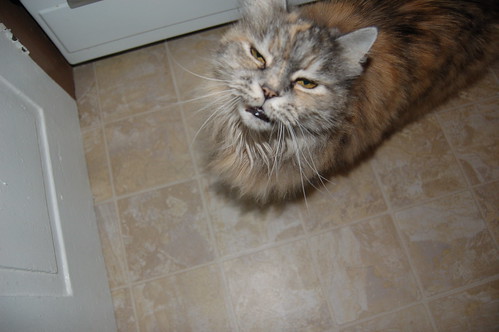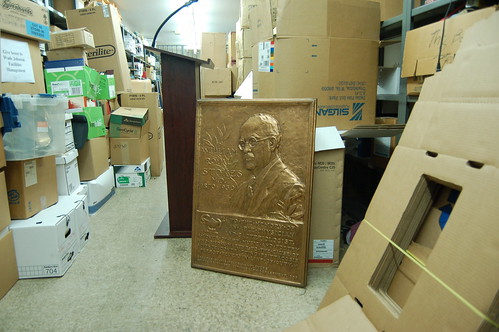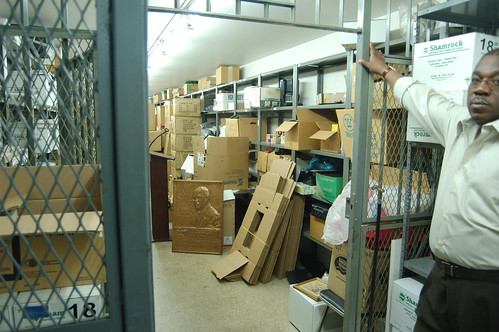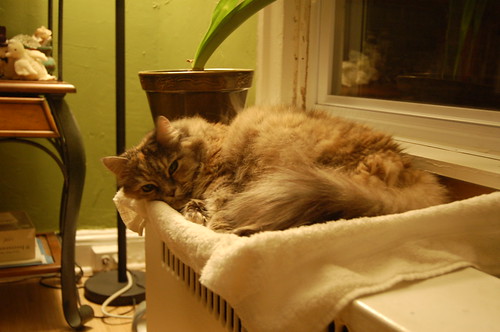The sun streamed in through the louvred shutters and it was a good feeling to be waking up in New Orleans. I left A. in bed and walked down the stairs to the “breakfast lounge,” a sunny room next to the pool. The offerings included make-your-own Belgian waffles and some fresh fruit, but none of the local delicacies I’d hoped for. Not bad, though, as these “continental” breakfasts go. I toasted two bagles and loaded a plate with cantaloupe slices, hardboiled eggs, and two donuts, and poured one cup of orange juice (all I could carry, figured we’d share). Back at the room, A. made coffee and we retired to the balcony to eat.
It was late, and then there was yesterday’s entry to type up, so we didn’t leave the hotel until after noon. We briefly tried to orient ourselves to the French Quarter via web sites but it was too confusing, too many bells and whistles, so we put on sunglasses and headed out through the lobby, grabbing a simple paper map on the way.
We had exactly one official goal, picking up a copy of the classic comic New Orleans novel, Confederacy of Dunces, for A. Again, we had tried to locate nearby book stores on line, but the search hadn’t told us that there was one across the street. We pushed open a sun-worn wooden door and found ourselves in the standard used book store, tall ceiling, dark, aisles almost impassable with teetering stacks of books, no immediately obvious system of organization. A cat flitted by. No Confederacy of Dunces. “I sell those as soon as I get them,” said the owner. We left and walked to the book store we had located on line, Arcadian Books and Art Prints on Orleans Avenue. Arcadian had a new copy of a recent edition, his last one. “I can’t keep them on the shelf,” said this owner.
Our errand complete, we strolled the quarter. The program for the day was that a large group of friends would meet the bride and groom around seven p.m. for a night out in the French Quarter, but, until then, we had time to kill and just felt like exploring. At this hour – in the early afternoon – the neighborhood had a bleary, empty feel; I had the sense that preparations were being made. It was difficult to get used to the sight of people drinking in the street. There weren’t many, yet, but a few hardcore types clutched plastic cups and even bottles, which I’d understood was a step too far. The police didn’t seem to mind, though. The businesses have naturally adapted to serve a clientele interested in drinking in the street. One t-shirt shop had a small counter at the edge of its open entryway specifically for selling takeout beer. Another shop displayed a large sign: “Big Ass Cups of Beer To Go.” But drinking in the street was only one of many options. Some of the bars were already filling up, the remnants of the lunch crowd mixing with those getting an early start. In one mostly empty establishment, strange octopus-like contraptions dangled from the ceiling along the bar. They looked to us like multi-person beer bongs, or devices with which a beer can be delivered to your gullet through a tube with the force of gravity behind it. Usually this is a simple tube used by one person at a time; one person pours in the beer while the drinker holds the tube up to his mouth. This sort of appliance is assumed to be a standard feature of the college years, although the only place I ever ran into one was in an apartment I was sharing with two other Coasties in Miami in the 1990s, when, at a housewarming party we threw, I was startled to see that some of the guests had adapted a garden hose to this purpose and were standing in a flowerbed, drinking beers that someone else was pouring in from our third-story balcony. About the same time that I realized that these particular guests were underage (so it goes, when a military unit is hanging out together), the cop who lived in the complex was just getting into his car and leaving for work. As he drove by, he actually put his hand up to the side of his face as if to block his view of this spectacle, perhaps wanting to actually clock in for his shift before he had to start processing an arrest. I took the garden hose from the balcony crew and hid it in a back bathroom.
Speaking of balconies, in our exploration of the French Quarter, A. and I turned a corner and happened upon an impressive method of loading cases of beer into the second story of a restaurant. One man stood next to a Bud Light truck, pulling cases out of the truck and then heaving them up to a man standing on the top of the truck, who then tossed them to a man standing on the balcony. The hardest job of the three was the first, since he had to heave full cases of beer about six feet above his head. He looked like the new guy, his arms not quite as ropy and hard-looking as those of the other two men, so – even though less able to do the job – he’d been given the grunt work. As we watched, he seemed to visibly tire, and his last couple of throws barely reached the top of the truck even though he had put his flailing all into them. “Now that’s how you deliver some Bud Light,” said a passerby.
We didn’t get much further before we realized that we were hungry for lunch and stopped at the Turtle Bay Cafe Roma for sandwiches. They had just gotten a 15-pizza delivery order, they warned us, so our meal would take a little while. We didn’t mind and enjoyed sipping our beers in the cool, dark bar, watching the people streaming past on the bright sidewalk outside.
In the late afternoon, we strolled back to the hotel. A couple of beers, our full bellies, and the warm sun – not to mention our late arrival the night before – had left us drowsy, and we wanted to get a quick nap in before what we expected to be a demanding evening. We hung a “Do Not Disturb” sign on the door, closed up the blinds, and climbed into bed. I was just dropping off to sleep when the phone rang, loud, jangly and piercing. A. answered. In my half-awake state I couldn’t follow exactly what was going on; I thought that perhaps one of our friends was trying to reach us to let us know where to meet up for the evening. (I’d had the foresight to turn my cell phone off before the nap, so they wouldn’t have been able to reach us that way.) But when she hung up, she explained that the front desk had called because “an engineer needs to get into our room to do something to the tub.”
“But he’s going to check and see if the engineer has to get in right now or if he can come back later,” A. said.
I took the return call. Sorry, said the front desk, but the engineer needs to get in now. I felt myself turning incandescent with rage. The last good night’s sleep I can remember getting was in 10th grade, and I don’t think I’ve successfully fallen asleep for a restful afternoon nap since I was about seven. Sometimes I think I will never feel fully rested again for the rest of my life, so it had been with no little surprise and pleasure that I had felt myself dropping off to sleep.
“This is a funny way to run a hotel,” I said. “I paid for a room and I was using it to take a nap. I didn’t want to be disturbed, which is why there was a “Do Not Disturb” sign on the door.”
“Oh, yes, I know, sir,” said the clerk. “That’s why we’re calling. Because of the sign, we didn’t want to risk barging in on you.”
I was too befuddled with sleep to grapple with what I later realized was the insanity inherent in this statement, hinging as it does on a rather unconventional understanding of the concept of not disturbing someone. I hung up on the clerk, hunted up some clothes, and opened the door for the engineer. A. and I retreated to the balcony while he worked. I was so angry that I was shaking and there was a moment or two when I was afraid I might actually throw up my lunch, which was suddenly sitting on my stomach like a brick. For this I was paying $100 a night? To be treated like they were doing me a favor by letting me stay in their hotel? To rent a room and have it to myself – unless of course someone needs to come in? A door slammed. I wondered if the engineer was done but assumed that, since he had noticed how angry I was when I let him in, he would have been at pains to let me know that he was leaving so that I could get on with my afternoon. But after a few more minutes with no further sign of him, I climbed back into the room (balcony access is through a large window, for some reason), slamming my head into the window sash in the process.
Sleep was out of the question, I realized as I sat on the edge of the bed, rubbing my head. I picked up my socks.
“I’m going to go talk to them,” I told A. “I’m not paying for today.”
I grabbed the “Do Not Disturb” sign off of the door and walked down the stairs to the lobby, trying to get my thoughts in order so that I would not lose my temper or swear. The clerk was apologetic, though, and this defused the situation, plus he had what sounded like a good excuse, until I thought about it some more later.
“I thought the engineer needed to get in to fix a problem that you had called about, sir,” he said. “That’s why I called. I sincerely thought I was expediting something you wanted taken care of. I didn’t realize that the engineer just needed to get in for a routine check.”
He kept apologizing, but the desired “and we’ll give you a free night” never came, and I could never bring myself to ask. Eventually, shamed at my lack of a spine, I slunk away, thinking that maybe I would just dispute the charge later with American Express. As I once again lay in bed, knowing that I would never be able to fall asleep but hoping that if I just closed my eyes for a little while the choking sensation of rage in my chest might dissipate, I realized that the clerk had been lying. If he had really thought that the engineer was responding to our service request, what had he made of A.’s confusion when he called the first time, and my anger the second time? What would our reaction have needed to be to indicate that we were not, in fact, awaiting a service visit? Maybe he would have gotten the message if we had blown a police whistle into the phone. Actually, I’ll never again go to sleep in a hotel without unplugging the phone first.
Then I started to dwell on the little piece of information that the clerk had let slip. The engineer had only needed to get in for “routine maintenance”? For no particularly urgent reason, in other words.
And seeing a “Do Not Disturb” sign on our door, what did he do?
He called down to the front desk to request that they, um, disturb us with a phone call so that he wouldn’t have to do it by knocking.
I realized that the clerk and the engineer would both have to die.
I reached under the mattress, retrieved my pistol, and racked a round into the chamber. A. immediately started packing and wiping the room for prints.
Not really (that’s the Cormac McCarthy novel’s influence talking), but goddamn, what a way to kick off a weekend in New Orleans. That’s the Dauphine Orleans Hotel, people. Do me a favor and stay away, and tell them I didn’t send you. (And what a shame, because otherwise it seems like a great place. If they make it up to me, I’ll let you know that you’re allowed to stay there again, but if they don’t, and you do stay there, I’ll bury you right next to the clerk.)
A. managed to fall asleep again and I booted up the laptop and wrote up the story of the “Do Not Disturb” sign. Then I got out my diary and noted that I had written in my diary. Then I wrote in my diary about writing about writing in my diary in my diary.
Telephone calls were made. Text messages were sent. The plan came into shape. A. and I showered and dressed and left the hotel around 7:30 to walk over to Kevin’s hotel, where the bar, Ohm, had been tentatively selected as the evening’s stepping-off point. At first I took “ohm” to be a reference to the Hindu peace mantra they make you chant after yoga classes, but the sign also included the upside-down horseshoe symbol for the metric unit of electrical impedance/resistance (also known as the “ohm”). Meanwhile, the decor was Asian, with rice-paper style watercolors of Samurai and ceramic imitation takeout buckets for candleholders. Lava lamps and psychedelic projections and mechanical-sounding drum-heavy music added a further layer of ambiguity as to cultural referents. Kevin convinced me to order a Blue Moon, a Belgian white ale whose appeal was not apparent to me. It came with an orange slice, like they used to give us at soccer games when I was eight. The discussion turned to french fries. McDonald’s makes the best, everyone agrees, but there is such a small window of time in which they are edible. Wait to eat them for even a quick car ride home from the restaurant and they will be soggy memorials to what might have been by the time you unfold the bag. Such, such were the disappointments when I was a child.
We met the bride and groom at Pirate’s Alley Cafe, in an alley behind the St. Louis Cathedral, candlelit, open to the street. After a round, we moved on again, this time to Oceana, a restaurant where a table was being held for us through the web of connections people have when they have friends in the “service industry.” Many of the quarter’s streets were closed off to traffic and hordes of people were now pouring through the neighborhood, clutching plastic cups, the police visible on almost every corner, both NOPD and Louisiana State Police. Guess they really want this whole tourism thing to work out again. As we shouldered through the crowds I saw a white-haired woman confronting a white-haired couple. “You put me in this situation!”
At Oceana, our group of ten filed to an upstairs table. We were afflicted by a waiter who saw himself as a very amusing fellow. His phone rang while he was putting down cups of water. “That’s my agent! I must have got the part!” He recommended the crab cake and, when he heard that there were Marylanders in attendance, insisted that, if we didn’t think his crab cake was better than the Maryland version, “I’ll buy it.” The problem with the Maryland crab cake is that it’s “just crab – frankly, it’s kind of obnoxious,” he told us.
The waiter’s schtick included taking forever to even record our orders, a good tactic – from the waiter’s point of view – since it can result in more drink orders, and his tip for such a large party will be included in the bill anyway. But he was rarely around to take the drink orders anyway. “I think I’m sober again,” complained one guest. The room gave onto a wrought-iron balcony and the smokers and those of us who wanted to check out the view wandered back and forth through the rickety window. In the street below there was a Lucky hot dog cart, like the one staffed by Ignatius in Confederacy of Dunces.
Someone asked the waiter what else he does. Besides wait. “I run a youth hip-hop HIV prevention troupe,” he said, claiming to have performed all over the world. They wanted him so bad in Sydney, they put him on the Concorde to get him back in time for another show in Pittsburgh. “That was like an $8,000 seat,” he said. “And I just got in from Chicago on Tuesday.” Erin’s friend Courtney, who comes to Oceana “all the time” for the barbecued shrimp, said “he didn’t just get in on Tuesday. He’s been here a long time.” Crack use was alleged, though I couldn’t tell if this was a serious accusation or not. The waiter overhears that Erin and Greg will honeymoon in Costa Rica. “Beautiful place, you’ll love it,” he said. “I was there in – ” he scrunched up his face and thought ” – 1989. It’s so… tropical.”
The conversation takes some strange turns. “There are atmospheres where I like to see naked people, and atmospheres where I don’t.” “When I’m doing Primus on Guitar Hero, it’s like a special experience for me.”
Moving on from Oceana, we stop for takeout sweet mixed drinks from a sidewalk stand. The choice is between the Horny Gator, which comes in an alligator-shaped cup with two plastic green alligators balanced one atop the other (do I need to explain further?), “guaranteed to make you a better lover,” and the Hand Grenade, which comes with a little plastic hand grenade floating on the top and doesn’t seem to be guaranteed to do anything but give you a headache. I order a Hand Grenade and it is easily one of the most disgusting things I have ever tasted, at once too sugary but also lip-pursingly sour. At the first sip, I can feel a potential hangover awake in me, flexing its serpentine coils in the darkness, and so I drop it in a trash can as we pass through the gay section of Bourbon Street. (I noticed that, though the prospect of these drinks had been talked up quite a bit, almost none of the locals in the crowd we’re with actually buys one.) We’re headed for Lafitte’s, one of the oldest businesses – maybe even buildings – in the quarter, a blacksmith’s shop converted to a bar. It’s worth visiting on its own merits, says Erin, but the fact that the route to it passes the gay bars also plays a nice filtering role. “Most of the really dumb frat kids will just turn back when they see two guys kissing on the street.” “Yeah,” someone chimes in, “they’re afraid it might turn them gay, too.”
Our energy wanes, our sight grows dim. A. and I leave for our hotel and we are not the first to bail. It’s 1:30 a.m. by the time we are climbing into bed.
The next morning we learn that the bride and groom and their local friends outlasted us to the tune of three and a half more hours.






